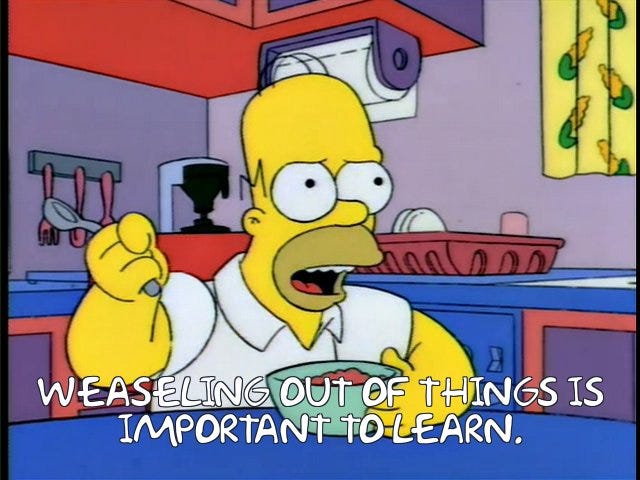The Weasel's Argument for Health Care Privatization
Or: How to advocate for privatization while pretending not to

This is the first in a two-part series analyzing Ontario Premier Doug Ford’s move to health care privatization and the news media’s relation and response to the policy. You can read the second part here.
Let’s not mince words: public health care in Canada is under attack. In truth, it’s been under attack for longer than current Ontario Premier Doug Ford’s time in office. Cuts to the system have reached back to the times of Kathleen Wynne and Mike "The Knife” Harris. The policy of worsening health care services Ontarians take pride in is a bipartisan approach.
Ford and his cronies know it, too. Internally, documents were found by Global News that outright admit Bill 124, which limits wage increases to 1 per cent per year for hundreds of thousands of public sector workers, is contributing to the health care crisis.
Despite this, Ford has pressed on with his dismantling of the system. The premier and Ontario Health Minister Sylvia Jones held a press conference on January 16th to announce a “three-step plan” that would transfer people waiting for knee and hip replacements and cataract surgeries to private clinics. The plan will use OHIP to pay private institutions for these surgeries, and is expected to worsen the staffing crisis at public hospitals. These changes will be permanent.
Oh, and the Ontario Superior Court’s decision to strike down Bill 124 as unconstitutional has also been appealed by the Ford government.
Meanwhile, in a phenomenon that can only be described as releasing a gang of overexcited weasels into a field for enrichment time, the think pieces and “analyses” that have erupted defending Ford’s presser have been truly unhinged. The shared approach is that they all substantively support privatization, while pretending they don’t. Put simply, they want to have their cake and eat it too. All rely on shock statistics, omitting evidence and a faux-position of measured evaluation.
A few points before we begin.
While the National Post has published an op-ed in favour of the move, I won’t be dissecting it here, or even linking to it. The classic Post line of “Liberals are overreacting” and general worship of privatization isn’t interesting, considering how they’ve been pushing that line for months. In some ways, it’s more respectable, because a decisive position has been taken.
Additionally, some of the outlets here have also published op-eds arguing against Ford’s maneuvers. This should not be taken as a defense of publishing the articles displayed here, as news media hangs its hat on hearing from “both sides.” As any seasoned media critic knows, presenting two sides lends credibility to both. This doesn’t make the arguments equally worthy of publication.
Without further ado, let’s get started.
CBC Waffles on Negatives to Private Healthcare
CBC ran a piece with the headline “If cutting surgical wait-lists is the only goal, Doug Ford's plan could work.” The author makes an argument that doesn’t address how for-profit clinics have been shown not to improve wait times. In fact, other than the number of people on wait-lists and the wait times for surgeries as they stand now, it doesn’t mention how this could help wait times at all.
It does mention that, if OHIP pays for cataract surgeries, as well as knee and hip replacements, this could contribute to a collective $690 million industry. The criticisms of where this money goes are addressed to pending ONDP leader Marit Stiles. None are made by the author in the piece.
When discussing the staffing issues private clinics will introduce, the article notes the following.
One of the big concerns is whether the creation of specialized clinics will bleed staff away from hospitals.
The government insists that won't happen, but the details are not sketched out yet, as shown by a quote in the province's own news release.
The piece then cites the release and an opposing voice saying private surgery clinics will be competing with public health care for staff. The provincial government’s knowledge that Bill 124 has contributed to staffing shortages is not raised at any point in the article. A clear sign that the issue is not taken seriously enough by the author.
On the subject of comparisons to Cuba and North Korea? “Ford did not disagree with the CEO's comparison.”
Well if he did, that would make it a weird comment to bring up, wouldn’t it?
Make a note that the Cuban medical system is not dissected by this or any other piece waffling on privatization. The successes of Cuba’s medical system specifically, and the news media’s refusal to acknowledge these facts, will be discussed in the next edition, but its absence is still notable for the purposes of this piece.
The Toronto Star Slips Through the Grips of Responsibility
Next up, we have the Toronto Star, which ran an opinion column by Rosie DiManno titled “I have no love for the Ford government, but they’re right — the status quo isn’t working for health care.”
DiManno’s piece begins by stating that her cataract surgery has taken 9 months to materialize, and that she has been struggling to see in recent months. This is then followed-up by the bulk of the piece that largely critiques the status quo in how health care has been handled, praising the Ford move. “This isn’t an attack on the universal health care precious to Canadians,” DiManno quips, as she lays out the dire situation we’re in now.
At this point it’s important to note that, throughout any of the three pieces evaluated here, solutions to our current health care situation outside of privatization are not discussed.
The column then goes on to raise the concern of staffing, but not elaborate on it, instead kicking up its rhetorical heels and parroting the Progressive Conservative line that they’ve dedicated $40 billion to the sector over the next decade. The premier’s knowledge of Bill 124’s negative consequences are not mentioned.
The piece does what others discussed here do and cites the tremendous backlog of surgeries being dealt with currently. While this column explains the capacity for this policy change to affect it, it doesn’t engage with the criticism (supported by evidence) that privatization does not help wait times.
The truly appalling moment comes when DiManno discusses those worried about this blatant move to privatization, addressing them as “those who seek to protect their monopoly on health care.” The monopoly on public health care, presumably? The use of such a negatively charged word in regards to health services is an intentional one. Its poor and unclear application is not explained.
Any possible extra charges to patients that may be piled on top of OHIP payments are dismissed out of hand.
This is all justified by the fact that the payment is still done through OHIP, and not a personal payment.
It makes one wonder if people truly believe the only privatization to worry about is one that is blatant, sudden, and done by a cackling, moustache-twirling villain. The legality of paying for-profit clinics through OHIP instead of personal payments is clearly meant as a shield that Ford intends people to pick up to defend the move. DiManno has done just that.
This column amounts to “I don’t like the PCs, but privatization is good.” No alternatives proposed. No refutation of opposing arguments. It’s the illusion of a nuanced take.
Matt Gurney Drives TVO Column Into the Flaming Wreckage
While this all amounts to truly cowardly stuff, the throne at the top of the squirrel heap must be ceded to Matt Gurney. In a column for TVO titled “Why Doug Ford’s health-care plan might be worth a shot,” Gurney supplanted the article with a truly pathetic tweet thread explaining how little faith he had in Ford, but let’s do it anyway.


I won’t spend long on the tweet thread, as the article has more than enough issues to fill out several editions of The Catch, but I will note a crucial moment indicative of his thought process. When informed that privatizing health care would make the most vulnerable Ontarians suffer more, Gurney replied “It’s more complicated than that.” He did not go on to explain the complexity.
Returning to the article, we see Gurney state quite openly why he did not explain the complexity of vulnerable Ontarians being left out by private care: He has no grasp of it. “I’m not going to make a sweeping pronouncement on the big picture yet” Gurney wrote. “In part because I need to do more of my own homework.”
I truly cannot convey how deep the pit of news media quality must go to have a piece published with these words. This is the beginning of the second paragraph. If I handed an assignment to a journalism professor that contained the sentiment “I need to research more before I say something,” I would receive a failing grade. This was four sentences in, followed by 19 more paragraphs. Why did you write about something without doing the homework? Why did you admit it?!
I will be fair to Gurney and say the piece is impressive in that it somehow gets worse from there. According to Gurney, people who have done the homework on the background of health care privatization, and what this presser means towards that step, are self-important fools. “Anyone snapping to a conclusion for or against the proposal in the absence of… info is projecting their prior opinions more than they are analyzing Monday’s announcement.”
Matt then immediately follows this sentiment with, my goodness, an entire paragraph contained within parentheses. It reads like a literary train wreck.
(I will, though, wholeheartedly agree that a government that trashed its prior Greenbelt commitments because it claims, well, gosh, the circumstances just forced our hand! doesn’t really get to play a “trust us, we swear!” card when it comes to limiting and overseeing any new programs. Credibility matters, and Ford and his advisers seem constantly surprised when people remember he has a habit of torching his.)
This is a tangent, but I can’t let this pass: Why is “well, gosh, the circumstances just forced our hand!” not in quotes while “trust us, we swear!” is? Why does the last sentence read like that? “Though” doesn’t need to be there, “that” doesn’t need to be used twice, the first sentence is such a run-on that…
Anyway, F. See me after class.
But beyond this car crash paragraph, the piece argues that something must be done, because the current status quo is not favourable. As we’ve seen, this is a common position taken to avoid proposing actual solutions.
Let’s summarize the points that Gurney makes against Ford’s move to privatize: The policy is unclear and relies on trust, which Ford has shown to break. Concerns about for-profit clinics siphoning health care staff are valid. The government’s current plans in this regard are not helping, and are not likely to help in the event of the future.
Now here’s his argument in favour of it: the status quo is bad.
That’s it.
Well no, that’s not fair. What remains of the article is a smug admonishing of those who are blaming solely the Conservatives, citing the problem stretches back beyond them. Yes Matt, neoliberalism is the dominating ideology of Canadian political parties and is against public enterprises in favour of market solutions. Would you like to interrogate that concept further? You have selected: no.
Instead, Gurney chooses to martyr himself and take a stand no one else in the history of Canadian health care discourse ever has.
But I also seem more willing than most to say aloud what a lot of people, including a horrifying number of health-care providers, are willing to say — but only privately. Our system has failed. In basic, fundamental ways. It cannot do what we require of it, and the result is death and suffering…
I am extremely open to better ideas, but I’m not hearing any from anyone in power or even close to it. So I think we need to start saying aloud what most of us say privately: our system has failed…
Matt, thousands of people have been saying it for years. Socialists, doctors, public health experts, patients, disabled Canadians… did you think this was a bold statement?

Conclusion
The fact these three articles were published in three separate mainstream publications of differing size and funding truly shows how unified the news media can be when profits are on the line.
While this is the clear approach taken by the news industry as a whole, it’s important to note when this is not the case in every instance. Credit where credit is due, the Globe and Mail published a very cogent and thoughtful piece refuting Ford’s move. The column is penned by Dr. Robert Bell, described as “professor emeritus in the Department of Surgery at the University of Toronto, former deputy minister of health for Ontario, and former chief executive officer of the University Health Network.”
In brief, Bell refers to publicly-funded community surgery centres and their effectiveness. He refutes claims the plan will aid backlogs (citing evidence that private health care does not improve wait times), the issues it has with staffing and Ford’s appeal of Bill 124’s deemed unconstitutionality. These are all crucial critiques coupled with sound proposals. Though the intentional moves of the Ford government to reach this crisis are not explained, I still highly recommend reading it in full.
It is important to note, however, that none of the pieces note the ongoing COVID pandemic as a major contributing factor to the Canadian health care crisis. The phantom virus strikes again, leaving a gaping hole in even Bell’s analysis. Public health is simply detached from this situation in the news media, even in the articles with substance.
Anyway, the solutions mentioned here and in Bell’s article are exactly what someone like Gurney is supposedly looking for, yet they’re absent in any of the three pieces discussed here, especially Gurney’s. Why? As must always be remembered, Canada is a neoliberal society which prioritizes the market. Even though two out of three of the pieces may not be strictly privately owned, they all reflect the dominating ideology: markets are best.
This is not the case, especially in terms of health care. As the Globe and Mail piece shows, even for-profit news media is capable of thoughtful (if flawed) critique in this regard. Support for privatization is blatant, but also betrays an ignorance: in the immediate aftermath of a large shift to privatization, they simply do not care about investigating other solutions.
Which is why the weaselly nature of these articles is so galling. Taking a position in this discussion should not be derided by the type of person who refuses to consider all the evidence. But that’s what they’ve chosen to do. The person who claims to be principled by sitting above a conclusion, choosing a “gotta hand it to ‘em” approach, or simply ignoring contrary evidence, is taking a position. They just won’t openly admit the position they’ve assumed supports privatization itself.
As for better solutions? Well even The Globe and Mail won’t admit we can go beyond community surgery centres. That’s on the next edition of The Catch.




